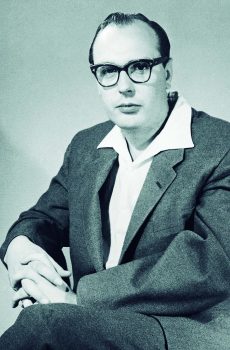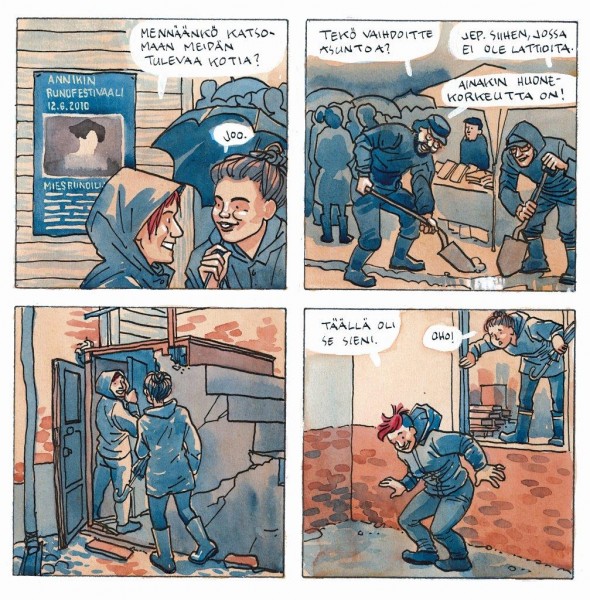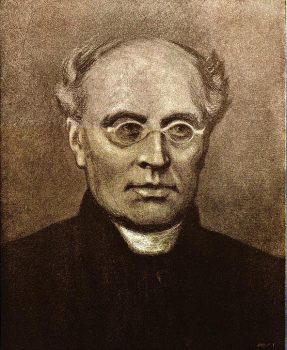Search results for "2010/02/let-us-eat-cake"
Travelling light
30 September 2005 | Fiction, poetry
Where roads reach through nights
into a fresh infant nightfall
with forest growing rooted to roots and stars,
and darkness canters along
on her black mare,
canters along at a silent pace,
she combs her hair
on the starry comb
and then slips into eyes to sleep.
But here nights are nights
of rooms, mere darkness:
light a light, it’s no night,
put out the light, it’s night,
that’s all,
and not here alone but everywhere
that rooms are ranged in rows
in piles.
Houses sleep, breathe earth’s vastness
so that each of you, alone,
but neighbouring together,
will fill with stars.
From Vaeltanut (‘Travelled’), 1956 More…
How to win literary prizes
30 September 1991 | Archives online, Fiction, Prose
A short story from Terveessä ruumiissa (‘In a healthy body’, Gummerus, 1990)
Later, as he mulled over the moments just before it all happened – with himself delivering his appreciative peroration to the prizewinner in the front row – the Chairman of the Prize Committee could recall no warning sign. Antti was tense, of course, but, considering his artistic sensitivity and the hundred-strong audience, there was nothing abnormal about that.
The Chairman was improvising from scanty notes: only the finishing touch was written out in full:
‘And so, with immense gratitude, we shall store up your many achievements in our hearts and minds.’ More…
The pearl
30 December 1999 | Fiction, Prose
A short story from Tutkimusmatkailija ja muita tarinoita (‘The explorer and other stories’, Loki-kirjat, 1999)
My name is Jan Stabulas. I am one of the quietest and inconspicuous workers in our department store, this giant ant-heap swarming with people. No one really pays any attention to me, although I am on show all the time. My job is quite simple: to stand in the menswear department, dressed in fashionable clothes. Now that doesn’t take much, I have heard it said. Well, try it yourself. Try standing for ten hours, without moving, in an awkward, even an unnatural, position, wishing that the air conditioning would work when it was hot, or that it would be switched off when you can feel the draught cutting you to the marrow. Think how the customers stare at you as they pass by, like an object which they cannot buy, and consider your words once more. More…
Sensitivity session
30 June 1978 | Archives online, Fiction, Prose
An extract from the novel Ja pesäpuu itki (‘And the nesting-tree wept’). Introduction by Pekka Tarkka
Taito Suutarinen knew quite a bit about Freud. Where Mannerheim’s statue now stands, Taito felt that there ought instead to be an equestrian statue of Sigmund Freud. It would be like truth revealed.
Freud, urging on his trusty stallion Libido, would be clad from head to foot in sexual symbols – hat, trousers, shoes: one hand thrust deep into his pocket, the other grasping a walking-stick. The stick would point eloquently in the direction of the railway tracks, where the red trains slid into the arching womb of the station.
Taito had also attended a couple of seven-day sensitivity training courses, where people expressed their feelings openly, directly and spontaneously. By the end of the first course Taito was so direct and spontaneous that he couldn’t get on with anybody. By the end of the second he was so open that everyone was embarrassed. Every member of the group had cried at least once, except the group leader. Never before had Taito witnessed such power. He could not wait to found a group of his own. Taito’s group met in a basement room, where they reclined on mattresses to assist the liberation process. Everyone was free to have problems, quite openly. You were not regarded as ill: on the contrary, if you realized your problem you were more healthy than a person who still thought he mattered. Moreover, as Taito, fixing you with his piercing gaze, was always careful to emphasize, every problem was ultimately a sexual problem. Taito would spontaneously scratch his crotch as he spoke, making it clear that he himself had virtually no problems left. More…
The bully
31 March 1996 | Archives online, Fiction, Prose
A short story from Tulen jano (‘Thirst for fire’, Gummerus, 1995); power relations between doctor and patient in a situation where the past will not leave either alone
Nurmikallio, an apparently ordinary middle-aged man, came back again and again, and it seemed as if there would be no end to his story.
I listened to him patiently at first. Repeatedly he returned to the same subject. The form and emphases of the story changed, new memories emerged, but the gist was the same: he had failed in his life and believed that the root cause of his failure was a particular person, a childhood class-mate, a bully.
On the basis of his first visit I wrote a short character-sketch:
Intellectually average. Talkative, but by his own account solitary. Difficulties in human relationships, separated, no children. Electrician by profession, says he likes his work. Biggest problem obsessive attachment to childhood traumas.
And that’s all, I thought. But he was not to be so easily dismissed.
He came in through the bathroom window
30 June 1991 | Archives online, Fiction, Prose
A short story from Utslag och andra noveller (‘Rash and other stories’, Alba, 1989). Introduction by Pekka Tarkka
He heard a voice behind him:
‘Hey, Aspelin, what are you doing here?’
Awakening from a half-sleep, he looked around as Ilpo approached his seat.
‘I work near here. I’m teaching math to the visually impaired.’
Ilpo sat down next to him. For several seconds they sat without speaking. Then Aspelin collected himself.
‘And you?’
‘Visiting a friend. He lives in Mäkkylä.’ More…
The best thing
30 September 2004 | Fiction, poetry
Poems from Valekuun reitti (‘The path of the false moon’, WSOY, 2004). Introduction by Herbert Lomas
At first light I put my hand
in the hollow of a white willow –
once someone's cigarette box
had been left there –
now a bird flew out
going seaward.
Touch of a wingquill on the back of my hand.
It flew higher.
In the evening
I felt its touch on my shoulder blade.
Love is the only song
7 August 2014 | Fiction, poetry
Poems from Helise, taivas! Valitut runot (‘Ring out, sky! Selected poems’, Siltala, 2014). Introduction by Marja-Leena Mikkola
Who will tell me?
Who will tell me why white butterflies
strew the velvet skin of the night?
Who will tell me?
While people walk, mute and strange
and they have snowy, armoured faces,
such snowy faces!
and the eyes of a stuffed bird.
Who will tell me why in the morning, on the grass,
the thrushes begin their secret game?
Who will tell me?
While black soldiers stand at the gate
in their hands withered roses
such withered roses!
and broken tiger lilies.
Who will tell me, quietly in the sun’s shadow
how to bare my heart?
Who will tell me?
Come to me over the fields
Come close and softly
so softly!
Open the clothes of my heart. More…
Landscapes of the mind
30 June 1986 | Archives online, Fiction, poetry

Tuomas Anhava. Photo: Otava
In his book Suomalaisia nykykirjailijoita (‘Contemporary Finnish writers’), Pekka Tarkka describes Tuomas Anhava’s development as a poet as follows: In his first work, Anhava appears as an elegist of death and loneliness; and this classical temperament remains characteristic in his later work. Anhava is a poet of the seasons and the hours of the day, of the ages of man; and his scope is widened by the influence of Japanese and Chinese poetry. As well as his miniature, crystalclear, imagist nature poems, Anhava writes, in his Runoja 1961 (‘Poems 1961’), brilliant didactic poems stressing the power of perception and rebuffing conceptual explanation. The mood in Kuudes kirja (‘The sixth book’, 1966) is of confessionary resignation and intimate subjectivity.
Anhava’s literary inclinations reflect his most important translations, which include William Blake’s The Marriage of Heaven and Hell (1959), selections of Japanese tanka poetry (1960, 1970, 1975), Saint John Perse’s Anabasis (1960), a selection from the works of Ezra Pound, published under the title Personae, and selections from the work of the Finland-Swedish poets Gunnar Björling and Bo Carpelan.
![]()
Song of the black
My days must be black,
to make what I write stand out
on the bleached sheets of life,
my rage must be the colour of death, to make my black love stand out,
my nights must be summer white and snow white,
to make my black grief burn far,
since you're grieving and I love you
for your undying grief.
Let the sun's rolled gold gild dunghills,
let the moon's blue milk leak out till it's empty,
we're not short of those.
The obscure black darkness of the cosmic night
glitters on us enough.
From Runoja (1955)
Picture this
9 April 2015 | Articles
It’s impossible to put Finnish graphic novels into one bottle and glue a clear label on to the outside, writes Heikki Jokinen. Finnish graphic novels are too varied in both graphics and narrative – what unites them is their individuality. Here is a selection of the Finnish graphic novels published in 2014
Graphic novels are a combination of image and word in which both carry the story. Their importance can vary very freely. Sometimes the narrative may progress through the force of words alone, sometimes through pictures. The image can be used in very different ways, and that is exactly what Finnish artists do.
In many countries graphic novels share some common style or mainstream in which artists aim to place themselves. In recent years an autobiographical approach has been popular all over the worlds in graphic novels as well as many other art forms. This may sometimes have led to a narrowing of content as the perspective concentrates on one person’s experience. Often the visual form has been felt to be less important, and clearly subservient to the text. This, in turn, has sometimes even led to deliberately clumsy graphic expression.
This is not the case in Finland: graphic diversity lies at the heart of Finnish graphic novels. Appreciation of a fluent line and competent drawing is high. The content of the work embraces everything possible between earth and sky.
Finnish graphic novels are indeed surprisingly well-known and respected internationally precisely for the diversity of their content and their visual mastery.
Life on the block
Daring to dream
30 June 2004 | Fiction, poetry
Poems from Vaaksan päässä taivaasta (‘A span away from heaven’, Teos, 2004)
In the evenings they lit a candle on the cat’s grave
In the daytime they made a cosmological model
with a skipping rope
feet tapped the rhythm and its shadow
the rope slapped against the street
once in a while a rock flew
against a concrete wall
plunged from the oval galaxy’s edge
to the edge of space. More…



